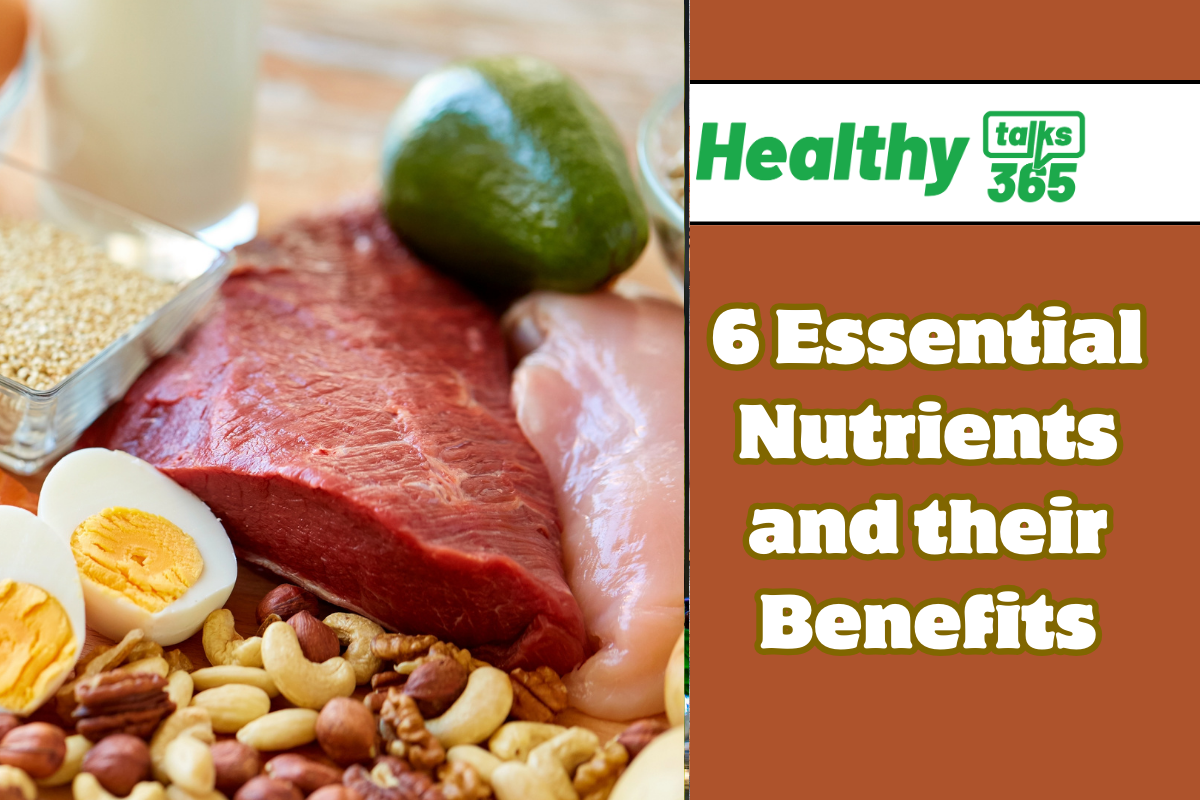6 Essential Nutrients and their Benefits
1. Protein:
Protein is a nutrient found in foods like meat, poultry, fish, eggs, dairy products, legumes, nuts, and seeds. It’s made up of smaller units called amino acids, which are essential for various bodily functions.
Protein plays many important roles in the body. First and foremost, it’s crucial for building and repairing tissues. This includes repairing muscle tissue after exercise or injury and building new cells to support growth and development. Protein is also necessary for the production of enzymes, hormones, and other important molecules that regulate bodily processes.
2. Vitamins
Vitamins are like tiny helpers that our bodies need to stay healthy. They’re found in the foods we eat, and each one has its own special job to do.
For example, vitamin A is great for keeping our eyesight sharp and our skin healthy. The B vitamins help turn the food we eat into energy, so we have the fuel we need to keep going. Vitamin C is like a shield for our immune system, helping us fight off colds and other illnesses. Vitamin D helps our bodies absorb calcium, which keeps our bones strong and healthy. Vitamin E is like a protector, keeping our cells safe from damage. And vitamin K helps our blood clot, so we don’t bleed too much when we get a cut.

3. Minerals
There are two types of minerals: macrominerals and microminerals (also known as trace minerals). Macrominerals are needed in larger amounts, while microminerals are needed in smaller amounts.
Some common minerals include calcium, magnesium, potassium, sodium, iron, zinc, and selenium. Each mineral does something special in our bodies and helps keep us healthy. For example, calcium helps us build strong bones and teeth, magnesium helps our muscles and nerves work properly, and potassium helps regulate fluid balance and keeps our hearts beating regularly.
4. Fats
Fats are nutrients our bodies need to work right. They give us energy, help our cells grow, protect our organs, and let us soak up certain vitamins. There are a few kinds of fats. Saturated fats are usually solid at room temperature and are in foods like butter, cheese, and red meat. Eating too much of these fats can raise cholesterol and cause heart problems.
Unsaturated fats are usually liquid at room temperature and are in foods like olive oil, nuts, and avocados. These fats are better for us and can help lower cholesterol and prevent heart disease.
Read Also:
5. Carbohydrates
Carbohydrates, both in the form of simple and complex carbs, are vital nutrients found in various foods like bread, pasta, rice, fruits, vegetables, and grains. While simple carbs, such as those in candy and soda, offer quick energy bursts, they can lead to blood sugar spikes and are less healthy options overall.
On the contrary, complex carbs, found in whole grains, beans, vegetables, and fruits, provide sustained energy and come with essential nutrients like fiber, vitamins, and minerals. These nutrients offer several benefits: they serve as the primary energy source for our body, support brain function through glucose provision, maintain digestive health via fiber intake, aid in weight management by promoting satiety, and contribute to overall nutrient intake.

6. Water and Fibre
Water is really important for us. It’s a clear liquid that we need to stay alive and healthy. We drink water to keep ourselves hydrated, cool down our bodies, help our joints move smoothly, digest our food, and get rid of waste. Without enough water, we can feel tired, dizzy, and even get sick. So, it’s crucial to drink water throughout the day to keep our bodies working right.
Fiber is another important thing found in certain foods like fruits, vegetables, whole grains, nuts, seeds, and beans. Unlike other foods, our bodies can’t fully break down fiber, so it passes through our digestive system without getting absorbed. Fiber helps keep us regular by adding bulk to our poop and making it easier to go to the bathroom. It also helps control our blood sugar levels, lower our cholesterol, and keep us feeling full. Eating plenty of fiber-rich foods is essential for good digestion and overall health.




